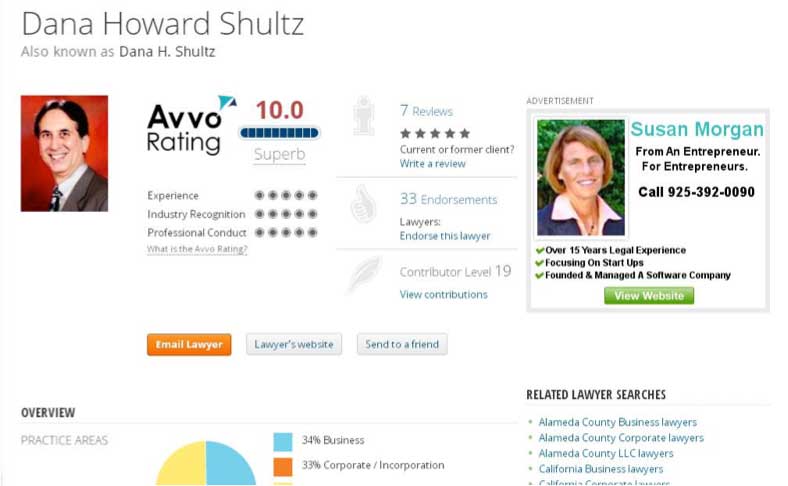Answering questions on Quora, writing his blog, and contributing to Avvo are the primary sources of clients for this San Francisco solo.
Dana H. Shultz is a solo attorney working out of his home office in the East Bay area of San Francisco, California. His law practice helps early stage startup companies and foreign businesses establish a U.S. presence. He has dominated his niche by focusing his efforts on creating online content through his specialty blog and by answering questions people ask on Quora and Avvo.

Mr. Shultz’s business law blog is located at http://danashultz.com/blog. You can find him on Avvo at http://www.avvo.com/attorneys/94611-ca-dana-shultz-239301.html and on Quora at http://www.quora.com/Dana-H-Shultz.
1. What kind of marketing works best for you in generating new leads for your practice?
For the past several years now I’ve gotten most of my new clients through online activities, which means my blog principally, and answering questions on Quora and on Avvo.
2. How do you track where your clients are coming from?
Every time I get a call from a potential client I ask them, “How did you find me.” And they usually answer something like, “Through a question you answered on Quora or Avvo, or they might say a referral from another lawyer, or something else. Maybe a former client.”
I also get people coming to my blog through organic searches, and those come to me through my blog, through Quora, or through Avvo.
By the time someone finds me online, they probably have used multiple of the foregoing and it all comes together. Among other things, early on, after I created my blog, I made sure a lot of the answers I was giving on Quora and Avvo included links back to my blog because I wanted to improve my SEO and I wanted to lead people to my blog from those other websites. Over time, I figured out that I don’t need to do that so vigorously.
There are times when I just wrote an introduction in my Quora answer and then provided a link to a blog post and maybe even quoted a part of the blog post in my answer. Now, I don’t feel compelled to link to blog posts every time because if people are interested in the answer and want more information, they’ll look me up and find my blog anyway.
I don’t know to what extent the search engines use my answer references to my blog versus someone else’s references to my blog, so I can’t say how those third-party citations are helping exactly, but people have told me that they researched me and I show up all over the place.
3. What other online marketing tactics are you using in conjunction with your blog and the question and answer sites?
That’s it for online. I have, over the years, provided answers at other places online, but I have since discarded them for a variety of reasons.
4. I see that you blog on topics that you’ve answered on Quora. Does that drive a higher engagement for you on either your blog or your Quora profile?
I don’t think I have an answer to that question.
Regrettably, one of the things I had to do about spam is shut down comments on my blog. So I don’t get a lot of comments on the blog. I’m not sure if I get more engagement on Quora as a result of blogging about my answers there, but it probably doesn’t hurt.
5. How has being a Top Writer on Quora made a difference in your efforts to attract new clients?
First, I’d like to point out that I was named a Top Writer in 2012 and 2013.
I haven’t noticed that it has made a difference in my efforts to attract new clients, but it has led to me having more followers on Quora. That means more potential new clients.
This blows me away. I have almost 5,000 followers on Quora and get 10 more each day. I write about a narrowly defined area: Business law. What I write about doesn’t get thousands, or even hundreds, of upvotes. Rarely does it even get a dozen upvotes.
What I neglected to say earlier is, somewhat for historical reasons but also because Avvo and Quora make it so easy, I post most of my answers to Facebook and Twitter. For me, as near as I can tell, this is absolutely worthless in generating new business. I just don’t get business from posting to those sites. I only have 200 followers on Twitter and people join or drop off every day. But I don’t post to Facebook much, except for personal reasons. Quora and Avvo keep me busy.
When I started my practice about a decade ago, I realized I needed to set objectives in terms of the amount of time I was putting in to certain activities. My benchmark was a 40-hour week — 10 hours for business development, 10 hours for administrative procedures, and 20 hours for billable time. In contrast to many lawyers, I track that stuff.
I track billable time to the 10th of an hour. I track administrative tasks and business development to the half hour because it isn’t important to be precise on that. It helps me keep track of my time. Then I go back and total it weekly, monthly, quarterly, and yearly to get some idea on how much time I spend on each activity. I feel that’s very helpful because then I can see if my business development efforts are paying off.
On one hand, if you don’t track your business development activity, it’s easy to put it off and not do it. A lot of lawyers don’t feel comfortable developing new business. They track their billable hours, and if they have time in the evenings or on weekends, if they’re not doing anything else, then they may try something. I think that’s wrong, backwards, and upside down.
Any business has to have customers, so it’s important to make time for business development. I make it a higher priority. You’ll figure out a way to do the work for the client.
6. You’re also active answering a lot of questions on Avvo. Does that help you generate new leads?
I don’t get a huge amount of business out of Avvo. It’s okay. It’s enough. In part, I do it because I get satisfaction from helping other people, and I learn a lot from other lawyers.
In terms of the types of questions that are asked on both sites, they’re dramatically different.

I answered this question (AVVO: What features of Quora would lawyers like to see in AVVO.com?) on Quora a while back, but Avvo tends to be more narrow and specific. It is definitely more state-specific. You tend to get more precise and narrowly focused questions, and answers. And I will say there are questions that come up repeatedly on Avvo. I believe it’s because, near as I can tell, Avvo does not do as good a job as Quora of telling people to research information.
A lot more people on Avvo have not taken that step at all.
On Quora, a lot of people don’t designate jurisdiction. When I answer a question, I’ll ask, “Which jurisdiction?” Or I’ll include in my answer, “From a U.S. perspective.”
There is some overlap. Some questions get asked over 100 times (for instance, should I incorporate my business or structure it as an LLC) on Quora, as well.
Generally, you get broader questions on Quora. Sometimes, business start-up questions are more theoretical in nature. They pertain to things that would never really happen. You’ll get questions on constitutional issues, for example, and they’re outside my bailiwick, so they’re not as important to me in my business. Nevertheless, Quora users do a better job of looking for information that is already online, and Quora makes it easy for answerers to redirect a question to a previous answer. I do that from time to time.
7. As founder of the Bay Area Business Attorneys Network (BABAN), have you realized any new business from your involvement there?
I have. Indeed, I started BABAN within a year of starting my practice because I retained a marketing consultant and she recommended it. After several years, I realized that BABAN has a greater value to me as a source of other lawyers in other practice areas to whom I can refer my clients. Knowing I have a dozen plus colleagues who are trustworthy, knowledgeable, and competent is extremely valuable to me because I know that my client is well taken care of.
I do get some referrals from other lawyers in the network but not a huge number. It would probably not be worth the effort to me if that was the only benefit. I’m a solo attorney with a home office. Most other members of BABAN are solo or in small law firms. Most of the benefit is social. We meet for coffee or for lunch and have fun.
8. How about your founding of In 2 USA NOW!? Is that a lead generator for you?
That’s interesting because I have developed, over the years, a sub-specialization. Other lawyers do this, but I’m the expert in helping foreign clients bring their businesses to the U.S. I have experienced entrepreneurs in foreign countries who want to have a presence in the U.S. looking for me. It’s almost always based on something they do in their country, but they want to start a business in the U.S.
You can visit the Foreign Countries page on my blog to get a list of countries these entrepreneurs come from.
It’s interesting how I got into that. Seven years ago I was active in the Silicon Valley Association of Startup Entrepreneurs (SVASE) and was running their East Bay section for quite a few years. We had an event we put together that had several organizations as sponsors. They were largely entrepreneurs. One of those sponsors was the Netherlands Business Support Office (NBSO), an agency of the Dutch government. They’re very active in getting business-related exchanges between the U.S. and the Netherlands — in both directions. I got my first referral from a representative of NSBO who had an established business in the U.S. He had set it up less than a year before. I must have done something right because since then I have had dozens of clients from the Netherlands and from NSBO referrals.
9. On your blog you have a page dedicated to your Hall of Shame, which calls out inadequate service providers. Has that benefitted your practice at all, especially with regard to attracting new clients?
I don’t know. I think that if there is a benefit, it is indirect. Compared to a lot of other lawyers, I’m very straightforward. I’ll qualify something I write if it needs to be qualified, but I don’t write paragraph upon paragraph of qualification, which only results in confusion.
When I answer a question, I write the same way I speak to my clients. This is important because a lot of lawyers seem not to get it. Business people, especially small business people, don’t want to read a legal treatise. They have a business problem and they want to know the legal ramifications of the problem. If they want a recommendation, I’ll give a recommendation, but they want the easy solution, not a long legal treatise.
A lot of lawyers write online the same way they write for The Law Review. I give up in very short order. And if I stop reading — I’m a lawyer — then what are your potential clients doing?
(Mr. Shultz has quite a list of businesses in his Hall of Shame.)
10. To what extent would you say your previous business experience has helped you attract new clients for your law practice?
Well, I think it has indirectly. Yes, I had business experience before becoming a lawyer and took a hiatus from the law for about 10 years in the 1990s. I am much more effective now as a lawyer and get more satisfaction as a lawyer than I did before taking that hiatus.
It benefits my clients and comes through in my writing. It has made me more direct in solving business problems in my writing rather than writing a legal treatise.
11. Has your decision to run a blog as opposed to a static website benefitted you in terms of lead generation? Any reason you wouldn’t have both a blog and a website?
I did have a static website. It’s still there, but it redirects to my blog. If anyone is interested, they can go to the main site — http://danashultz.com/ — and see it still there. It will redirect after about five seconds, or so, but it’s so old and unattractive.

I had this static traditional site and I’d change something every now and then. The other thing I did was, I sent out a monthly e-mail newsletter to contacts, however many hundreds there were, people I ran into (clients, previous clients, etc.). It was a good way to keep in contact, but there was no outreach to anyone new. I attended a seminar on blogging and was nervous when I thought about doing it. I thought I needed to start blogging. It was 2009.
It’s one thing to write one long page once a month. It’s another thing to write several shorter things several times a week or month. The good news is, I was able to get together the first couple of dozen blog posts based on my monthly e-mail missives in the previous years. I just repurposed them. That helped me ease into it.
After awhile, I got into blogging and realized I could do it. They’re just a couple of paragraphs long, and they’re tightly focused. They’re easy to work through.
I also realized that if I just looked at it and thought about what my clients were asking me, and what people online were asking, I would have plenty of material to write blog posts about. I was blogging three or four times a week. From what I understand, that’s pretty frequent, but I had plenty to say. I’ve got over 400 posts now. Virtually all of them represent good solid content. They’re not fluff.
Today, I blog less often because I’ve already said most of what I can say about my area of expertise. I blog about once a week on average.
What I write about, and clients care about, very rarely is subject to change in my area of law. For the most part, changes don’t have a direct impact on clients anyway. There is very little change in the law that will affect my analysis (e.g., Should I start an LLC or a corporation? Do I need venture capital money?).
The answer would be completely different if I were a litigator.
12. How would a lawyer go about getting started with Quora and Avvo if they wanted to increase their exposure to potential new clients?
First, they would have to identify their practice area. You want to focus. You can’t be all things to everybody. Figure out what matters to you.
Then, as I said a couple of times, answer questions succinctly and clearly and in such a way that is meaningful to business people. That’s true for lawyers who are appealing to businesses. As an aside, consumer-oriented practices may take a different approach. They may take an approach that looks more like advertising.
For areas like personal injury and divorce, there are pretty much no questions of that nature on Quora. There are on Avvo. But I don’t see them because I don’t look for them. People with divorce or personal injury questions are more likely to be on Avvo than on Quora.
I can see why. Historically, Quora started in Silicon Valley. It’s mainly for techies. Avvo explicitly tries to cover all realms of law whereas Quora would like to cover every piece of knowledge in the world, but it does not push itself in a particular direction.
Avvo’s business is built upon identifying every lawyer in the U.S. They ask lawyers to provide information about their practice areas. There already is a strong orientation within Avvo toward practice areas.
Quora doesn’t care as explicitly about who is providing the answer. Anyone can answer a question. That’s not allowed on Avvo. Quora cares more about the information and letting other Quora users vote it up or vote it down. Quora is crowd-sourced information whereas Avvo is more like authenticated — note quite the right word — legal responses.
I’m a bit unusual. Probably, there are more consumer-oriented lawyers who use online media but not many business lawyers who do that.
Consumer lawyers have to advertise. I suspect that relatively few of the people looking for those types of legal services are going to spend a lot of time reading answers to questions online. I suspect most of them are going to bite if they see something that looks professional and on target for what they require at the moment. In my case, another marketing consultant I used for a number of years made this point for me, what I write is that proof. My prospective clients aren’t interested in a billboard. They’re interested in the fact that I have solid content and that content shows them that I know what I’m doing.
13. About how long should it take before an attorney starts seeing new leads generated from blogging and answering questions on Quora and Avvo?
There was a time when I was more aware of that than I am now. In my case, it took about a year to get a significantly noticeable return. It definitely isn’t going to come in just a few weeks.
There are ups and downs in terms of business, marketing, attracting new clients, etc., but the part that I like is doing it. I enjoy it in the sense that it is stimulating and fun. On occasion, I get to be witty. I get satisfaction from helping people. So it works for me.
14. What other suggestions do you have for lawyers regarding attracting new clients or generating leads from Quora, Avvo, and blogging?
I think for a lawyer to do what I’m doing, there’s no way ghostwriting is going to work. It just wouldn’t be authentic. I can appreciate where there may be plenty of activities where ghostwriting would be fine. For law, however, it’s got to be you. It just can’t be a third party. It’s not going to work. You’re not going to have a third party answer questions, so why have them blog for you?
Way too many lawyers write for other lawyers rather than write for readers. You have to make your online writing more succinct and to the point.



